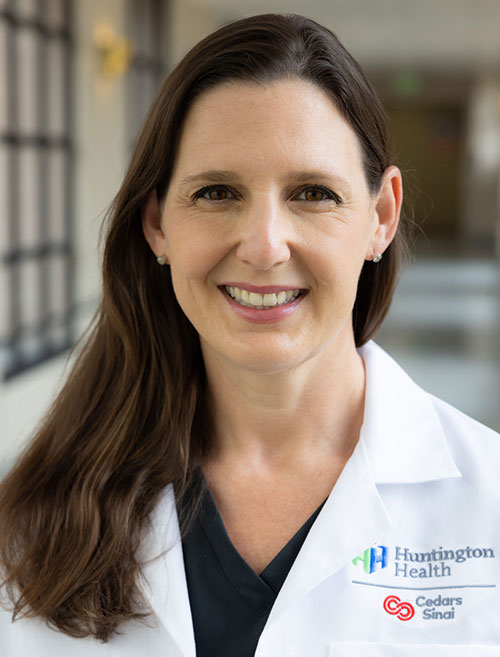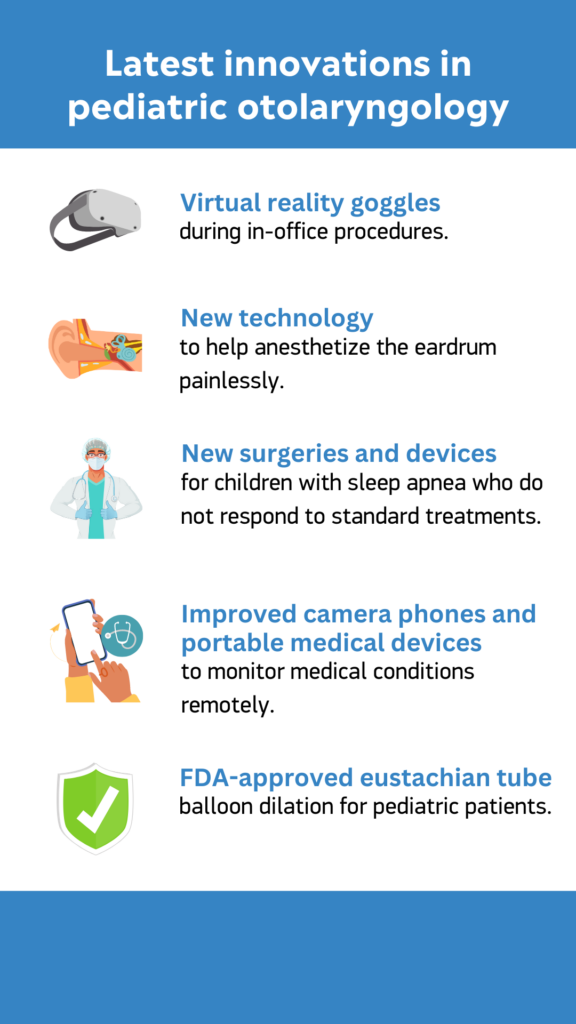February is Kids ENT (ears, nose and throat) Health Month. ENT specialists, or otolaryngologists, treat and manage conditions of the head and neck. To shine a light on ENT conditions that children experience, ENT specialist Alexis Rieber, MD, with Huntington Health, an affiliate of Cedars-Sinai, answered our top five questions.

1. What is the most common reason a patient needs to see a pediatric ENT specialist?
Many patients are referred to a pediatric ENT when the usual childhood illnesses and congestion become more frequent or severe than average. One of the unexpected silver linings of the COVID-19 quarantine was that kids in isolation did not get sick very often. Now we are experiencing a huge surge in upper respiratory illnesses. Research has shown a big increase in ear infections and tonsillitis over the past few years. We can offer surgical treatments for these recurrent problems.
Because there is a rise overall in pediatric allergies, I also see a lot of kids for congestion. When they become more than just stuffy during a cold, and symptoms last a few months, it is a good idea to see if there is an anatomic problem preventing your child from breathing well. This is especially important when the congestion is affecting their sleep, and they are showing signs of obstructive sleep apnea. We can do an evaluation of the adenoids and tonsils and consider corrective surgeries to help reduce congestion and sleep symptoms.
2. What other conditions do you treat?
One of the conditions I find most interesting is tongue-tie and/or tethered oral tissues, which can affect eating, speaking and breastfeeding, but it often resolves itself. This is a controversial topic with recent articles about the massive surge of popularity in treating it with surgery. This is partly because evidence has shown the important health benefits of breastfeeding, but also because of the marketing of this procedure as a cure for many problems like snoring, weight gain, reflux and orthodontic conditions. I obtained a Certified Lactation Counselor degree to help assess the latch and ensure we are only performing this procedure on patients who truly need it.
Another specialty of mine is pediatric hearing loss. Many children fail their newborn or pediatrician hearing screen, and it can be a very stressful or frightening experience for the family. Many times, we can address hearing loss if it is due to wax or middle-ear fluid. Other types of hearing loss need amplification with hearing aids or surgical correction. Treatment of these conditions requires close collaboration with otolaryngology, pediatric audiology, genetics and radiology.
3. How will I (or my child’s pediatrician) know if my child needs to see an ENT doctor –especially if my child is an infant?
Consider a pediatric ENT consultation when there is a concern for an anatomic abnormality that can be corrected. Breastfeeding that is painful or unsuccessful should be evaluated for tethered oral tissues. Babies with stridor, or noisy breathing, may benefit from an airway evaluation. Poor quality sleep that may be sleep apnea is best addressed and not ignored. There are some problems that are natural for kids to experience, but if infections are too frequent or severe, maybe there is something an ENT can do to help.

4. What innovations have made surgery unnecessary or less invasive?
Vaccinations have made some infections less common in pediatric patients. For example, the human papillomavirus (HPV) vaccine has significantly reduced recurrent respiratory papillomas (non-cancerous tumors) in children. Babies born with HPV infection transmitted during delivery are prone to tumors in their airway that can lead to serious breathing difficulties, frequent surgeries, hospitalizations and even cancer. It is wonderful we have found a way to prevent this from affecting the next generation of children.
Also, some medication treatments are available for sleep apnea that may help children avoid a tonsillectomy and adenoidectomy.
5. In what scenarios would you need to collaborate with other specialists to manage a patient’s condition?
Pediatric care is best delivered as a multidisciplinary team; it’s one of the reasons I love pediatric ENT so much. For children with sleep apnea, I rely on a pulmonologist to help perform sleep studies. For children with recurrent cough, croup or wheezing, I often work with a pulmonologist and allergist to diagnose and treat the proper condition. For babies with laryngomalacia and reflux, I often work with a gastroenterologist to optimize their eating, breathing and growth. For babies with breastfeeding difficulty, I often work with lactation consultants, occupational therapists and pediatricians to find the best care and treatment plan.
To learn more about Huntington Health’s ENT team, go to : Meet Your ENT (Otolaryngology) Team | Huntington Hospital (huntingtonhealth.org)
 English
English Espanol
Espanol 简体中文
简体中文 Tagalog
Tagalog հայերեն
հայերեն 한국인
한국인 Tiếng Việt
Tiếng Việt فارسی
فارسی русский
русский 日本
日本 عربي
عربي